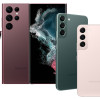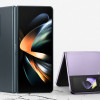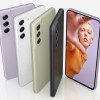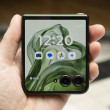Report from Redmond
Miscellaneous
So what's next? With Pocket PC, there are a few key directions the platform is moving toward. First, CDMA Phone Edition devices are on their way in the very near future. Second, Wi-Fi and Bluetooth will be fully built-in to the next version of the OS. And finally, while Pocket PC is currently geared toward business and prosumer users, future versions (2-3 years away) will also be designed to cater to consumers.
Another interesting tidbit, is that on a PowerPoint slide of operator partners for Pocket PC Phone Edition, all of the top-five U.S. carriers were listed. Interpret that however you like...
We also heard from Randy Walker, representing Verizon Wireless. He didn't have much to say in his presentation that would be news to anyone who keeps up with the headlines here on Phone Scoop, but I was able to ask him about Verizon's CDMA 2000 1xEV-DO trials in San Diego and Washington, D.C. He said that they have a van full of equipment that they drive around to test with, and so far it works great. While the theoretical peak speed is 2.4 Mbps for a whole cell, he said that the live trails show average real-world speeds for individual users to be around 300-600 kbps.
On a slightly off-topic tangent, gadget-lovers might be interested to hear about the demos of Smart Display and Tablet PC that we saw. In fact, most of us had some serious hands-on time with Tablet PC. I'll try to keep it short...
Smart Display was unimpressive. The idea is that you can simply pick up your display and take it with you around the house. (It's targeted at home users.) An example might be doing e-mail on the sofa while you watch TV. The problem is, it adds $600 - $1000 to the cost of a new PC, and you're still limited to just one person using the PC at a time. It's a neat idea, but I just can't see enough people deciding that this small convenience is worth that kind of extra money.

Tablet PC is another story. Tablet PC is extremely cool, and works pretty well. The key component is the unique stylus technology. It's not a touch-screen - it's more like a Wacom tablet. You can move the cursor by merely "hovering" the stylus over the screen, you can rest your hand on the display without affecting anything, and it's pressure-sensitive, so line thickness varies by how hard you press. It reads most handwriting fairly well, although you can't train it to learn your particular handwriting style. The showcase software for Tablet PC is Journal, which is just insanely cool. I'll leave a full explanation up to the PC sites.
But even though Tablet PC makes for the ultimate demo, I'm still not convinced it will be a commercial success. The fact is, no matter how "natural" handwriting is, typing will always be exponentially more efficient. Not all technological advancements are actually improvements over the old technology. But only time will tell...
Conclusion
Microsoft is the 800-pound gorilla in just about any market where they have a presence. Mobile devices are no different. They come to the table with a top brand, a huge installed user base with PCs, and a formidable army of developers. There are over 10,000 third-party applications for Pocket PC. Most of those could easily be ported to Smartphone, and many certainly will be.
It will be interesting to see how the mobile-phone market reacts to Microsoft's entrance. Pocket PC is a very powerful platform. In making Smartphone, Microsoft has "stripped out" very little, and even managed to add a few features, while putting the size and price in line with typical cell phones. This powerful formula is sure to have a major impact on the industry.


 Samsung Refreshes Galaxy S Series with S Pen, New Cameras
Samsung Refreshes Galaxy S Series with S Pen, New Cameras
 Samsung Refines its Foldable Phones
Samsung Refines its Foldable Phones
 Samsung Revives S21 Fan Edition
Samsung Revives S21 Fan Edition
 Sony's New $1,600 Flagship Sports Seamless True Optical Zoom
Sony's New $1,600 Flagship Sports Seamless True Optical Zoom
 Sony's Newest Compact, High-End Phone is the Xperia 5 IV
Sony's Newest Compact, High-End Phone is the Xperia 5 IV

